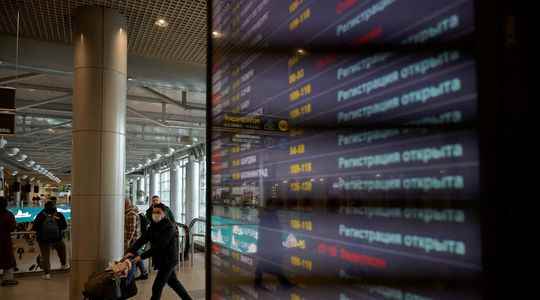In her Moscow apartment with a magnificent view of the tower of the Leningrad Hotel in Moscow, Flavie packs her bags with a heavy heart, her 3-month-old son snuggled against her chest. “It’s very hard to leave like that, so quickly, when we have our whole life here”, says this French woman in her thirties whose husband works in aeronautics.
Somehow, the family, who will leave Russia very soon, have tried to say goodbye in recent days to all the friends and acquaintances they met during their three years of expatriation. “On the last day, at our 4-year-old daughter’s nursery, we all burst into tears,” says the young woman.
“It is strongly recommended to French nationals, whose presence and that of their family is not essential in Russia, to make arrangements to leave the country by the still existing links”, advised Thursday morning, the Quai d’Orsay . At the same time, the French Embassy in Moscow has published on its website a list of indirect connections to return to France.
Exorbitant prices of plane tickets
Most direct air links with Europe being cut off, you have to go through Turkey, Armenia or even Qatar. However, it is very difficult to find plane tickets and the prices are exorbitant due to very high demand. Saturday, for example, it was necessary to count 1000€ for a one-way ticket Moscow-Istanbul, more than ten times the usual price.
Faced with soaring prices and the difficulty of finding a flight, some choose the land route to cross the border. They thus reach Finland or the Baltic countries, by bus, by car, and even on foot. “A friend will go by taxi to Ivangorod, on the Estonian border, then they will cross the bridge on foot with wife, children and suitcases, to Narva”, relates Flavie. From there, another taxi will take them to Tallinn, the capital of Estonia, where they will take a direct flight to France.
For Géraldine too, the departure is “violent” and “painful”, “even if we are aware that we are not in Ukraine, that we are not under the bombs”, specifies this expatriate in Russia for 3 and a half years. “For the moment, I am returning alone with my two children via Armenia. My husband, who is the Director of a subsidiary of a French group, will join us as soon as he can,” she said.
This unanticipated return poses its share of logistical problems: finding a solution to send the children to school, for accommodation, etc. “At 47 with my two children aged 17 and 13, I’m going back to my parents,” says Géraldine. “We have already organized the move because we did not want to risk it being blocked for a long time in Russia”, she specifies.
“No return possible”
About 5,000 French people currently live on Russian territory, according to the French consulate in Moscow. While many companies have taken the decision to repatriate their French employees, some leave the choice to their employees. This is particularly the case of Auchan, which operates 231 stores in Russia.
France, which has 700 business subsidiaries in the country, is “the first foreign recruiter in Russia”, indicates Bercy. It employs approximately 200,000 people, particularly in the field of mass distribution, automotive, hydrocarbons, etc.
But unlike several American or European multinationals which have announced their withdrawal from Russia or the closure of their stores such as H&M or Ikea, French companies are not yet closing their stores or factories on Russian soil.
However, many expatriates doubt that they will ever be able to return to work in Moscow. “We have the perception that there will be no possible return because the crisis will last”, comments a Frenchman present in Russia for 20 years.
